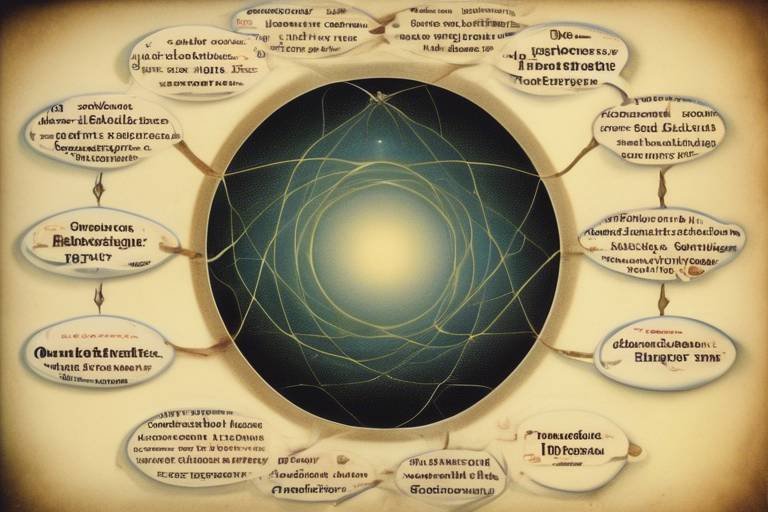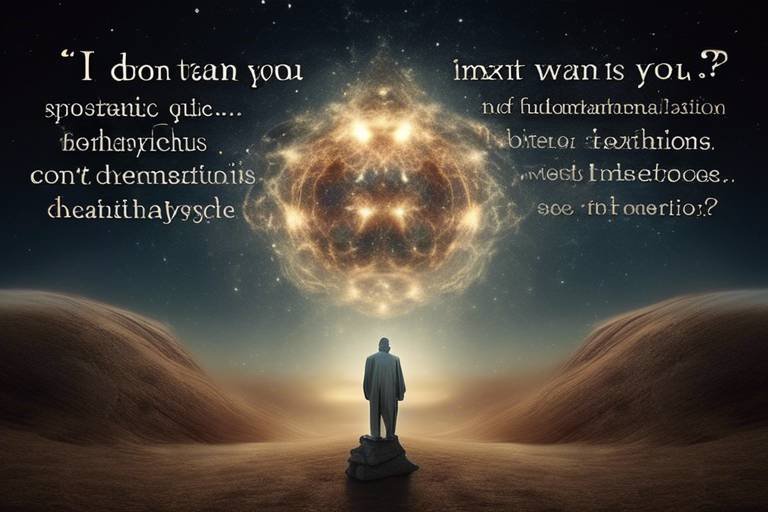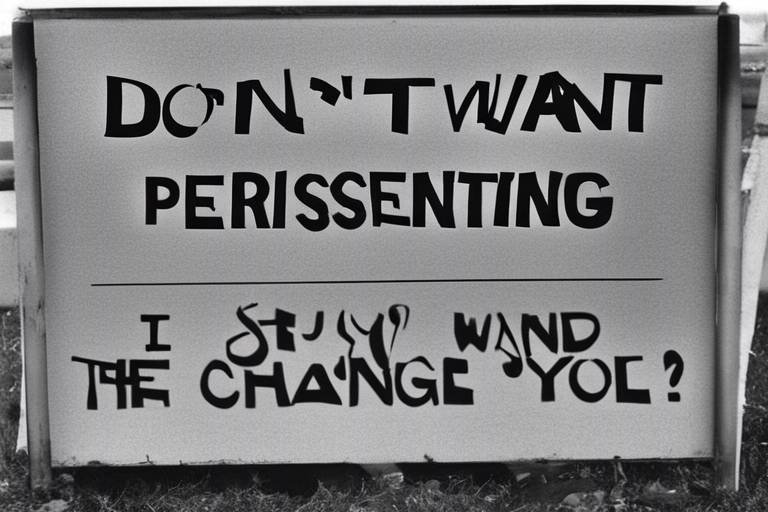Why is Ontology Considered Fundamental in Existentialism?
When we dive into the realm of existentialism, one of the first things that strikes us is the profound relationship between ontology and the human experience. But why is ontology so crucial in this philosophical landscape? At its core, ontology is the study of being and existence, serving as the bedrock upon which existentialist thought is built. It compels us to ask the big questions: What does it mean to exist? How do we define our reality? These inquiries are not just academic; they resonate deeply with our daily lives and experiences.
Imagine standing at the edge of a vast ocean, staring into the horizon. The water symbolizes the unknown, and the horizon represents our search for meaning. Ontology helps us navigate this metaphorical sea, providing us with the tools to understand our existence within it. In a world often perceived as chaotic or absurd, ontology acts like a compass, guiding us through the murky waters of identity and purpose.
Furthermore, ontology's significance in existentialism is illuminated through the works of key thinkers who have shaped this philosophical movement. Figures like Jean-Paul Sartre and Martin Heidegger have explored the implications of being, challenging traditional views and emphasizing individual freedom and responsibility. For Sartre, the idea that "existence precedes essence" encapsulates the essence of existentialism, urging us to create our own meaning in a world devoid of inherent purpose.
Moreover, the interplay between ontology and the concept of absurdity is another critical aspect that underscores its importance in existentialist thought. The absurdity of life, the conflict between our desire for meaning and the indifferent universe, can be daunting. Yet, through ontological inquiry, we gain insights into this struggle, allowing us to confront the absurd with courage and authenticity. This confrontation is not just philosophical; it is a deeply personal journey that each individual must undertake.
In essence, ontology is not merely a theoretical construct; it is a vital framework that shapes our understanding of existence, identity, and the human condition. By engaging with ontological questions, we embark on a quest for authenticity, striving to understand who we are in a world that often feels disjointed and chaotic. This exploration is fundamental to existentialism, making ontology a cornerstone of our quest for meaning and self-discovery.

The Role of Ontology in Philosophy
Ontology, the study of being and existence, is often regarded as the bedrock of philosophical inquiry. It invites us to ponder the fundamental questions of life: What does it mean to exist? How do we define reality? These inquiries are not merely abstract; they are deeply intertwined with our everyday experiences and perceptions. By exploring ontology, we delve into the essence of what it means to be, both as individuals and as a collective. It acts as a lens through which we can examine our existence, allowing us to navigate the complexities of life with a clearer understanding of our place in the universe.
One of the most compelling aspects of ontology is its ability to frame our understanding of reality. Consider this: if we define reality solely through physical existence, we might overlook the nuances of emotional, intellectual, and spiritual dimensions. Ontology challenges us to broaden our perspective, encouraging us to recognize that existence is multifaceted. It can be likened to an intricate tapestry, where each thread represents a different aspect of reality, woven together to create a cohesive whole.
Moreover, ontology raises critical questions about the nature of objects and their relationships. For instance, when we consider the existence of a chair, we don't just think about its physical properties; we also reflect on its purpose, its design, and even the emotions it evokes when we sit upon it. This relational aspect of ontology reminds us that existence is not a solitary experience but rather a shared journey where objects, people, and ideas interact in profound ways.
In philosophical discourse, ontology often intersects with other branches of philosophy, such as epistemology—the study of knowledge. Understanding what it means to exist can significantly influence how we acquire knowledge and interpret our experiences. For example, if we accept that our perceptions shape our reality, we must also acknowledge that our understanding of existence is inherently subjective. This interplay between ontology and epistemology enriches our philosophical discussions, leading to a more comprehensive understanding of the human condition.
Additionally, ontology plays a crucial role in ethical considerations. By examining the nature of existence, we can better understand our responsibilities toward others and the world around us. It prompts us to ask questions like: What is the value of life? How do our actions impact the existence of others? In this way, ontology not only informs our philosophical inquiries but also guides our moral compass, urging us to consider the implications of our choices on a broader scale.
In summary, ontology serves as a foundational element in philosophy, shaping our understanding of existence, reality, and the interconnectedness of all things. It challenges us to think deeply about the nature of being, encouraging a holistic approach to philosophical inquiry. As we navigate the complexities of life, ontology remains a vital tool that helps us make sense of our experiences, guiding us toward a more profound understanding of ourselves and our place in the universe.

Existentialism Defined
Existentialism is not just a philosophical doctrine; it's a vibrant movement that dives deep into the intricacies of human existence. At its core, existentialism emphasizes the primacy of the individual, the weight of freedom, and the profound nature of choice. Imagine standing at a crossroads in life, with countless paths ahead of you. Each choice you make shapes your identity, your essence, and your reality. This notion that we are the architects of our own lives is what sets existentialism apart from many other philosophical perspectives.
One of the most compelling aspects of existentialism is its focus on the subjective experience of being human. It challenges us to confront our existence head-on and to grapple with the often uncomfortable truths about our freedom and responsibility. Existentialists argue that we are not merely products of our environments, cultures, or even our biological makeup. Instead, we are free beings capable of making choices that define who we are. This idea can be both exhilarating and terrifying, as it places the burden of meaning squarely on our shoulders.
Existentialism also delves into the absurdity of life, highlighting the tension between our desire for meaning and the chaotic, indifferent universe we inhabit. This struggle can lead to feelings of alienation and despair, but it also opens the door to authenticity and self-discovery. In this sense, existentialism is not merely about acknowledging the absurd; it's about embracing it, finding our own meaning amidst the chaos, and living authentically in a world that often seems devoid of purpose.
To better understand existentialism, we can break down its key components:
- Individualism: The belief that each person is unique and responsible for their own existence.
- Freedom: Emphasizes the importance of choice and the inherent freedom of individuals to shape their destinies.
- Absurdity: Recognizes the conflict between our search for meaning and the universe's indifference.
- Authenticity: The pursuit of living in accordance with one's true self, rather than conforming to societal expectations.
In essence, existentialism invites us to embark on a journey of self-exploration and personal growth. It encourages us to ask the tough questions: Who am I? What do I want? What gives my life meaning? By engaging with these questions, we can forge a deeper connection with our own existence and ultimately find a sense of purpose in a world that can often feel overwhelming.

Key Existentialist Thinkers
When we dive into the world of existentialism, it’s impossible to overlook the profound impact of key thinkers who have shaped this philosophical movement. Two giants in this realm are Jean-Paul Sartre and Martin Heidegger. Their unique perspectives on ontology not only challenge traditional philosophical views but also illuminate the complexities of human existence.
Let’s first explore Jean-Paul Sartre. He famously declared that "existence precedes essence," which is a radical departure from the idea that a person's essence or identity is predetermined. Instead, Sartre argues that we are born without any inherent purpose, and it is our responsibility to create meaning in our lives. This notion of being "condemned to be free" places a heavy burden on individuals, as it suggests that we are solely responsible for our choices and the consequences that follow. Sartre's work, particularly in Being and Nothingness, delves deep into concepts of freedom, choice, and the often overwhelming nature of existence.
Now, shifting gears to Martin Heidegger, his seminal work, Being and Time, takes a different approach to ontology. Heidegger focuses on the concept of Being itself, urging us to contemplate what it means to exist. He introduces the idea of Dasein, which translates to "being-there," emphasizing the importance of our temporal existence and our relationship with the world around us. For Heidegger, understanding our existence is intertwined with our understanding of time; past experiences shape our present, and our awareness of mortality compels us to live authentically. His exploration of the interconnectedness of being and time reveals the layers of meaning that can be derived from our existence.
Both thinkers, while differing in their approaches, underscore a critical aspect of existentialist thought: the struggle for authenticity in a world that often feels absurd. They invite us to reflect on our own lives, encouraging a deeper understanding of who we are and the choices we make. In a way, engaging with their ideas is like embarking on a personal journey—one that challenges us to confront our fears, embrace our freedom, and ultimately define our essence in a universe that may seem indifferent.
To summarize the contributions of these existentialist thinkers, here’s a table that highlights their key ideas:
| Thinker | Key Idea | Significance |
|---|---|---|
| Jean-Paul Sartre | Existence precedes essence | Emphasizes individual freedom and responsibility in creating meaning |
| Martin Heidegger | Being and time | Explores the nature of existence and its relationship with time |
In conclusion, the thoughts of Sartre and Heidegger serve as a foundation for understanding the complexities of existence and the human condition. By engaging with their ideas, we not only explore the depths of ontology but also embark on a journey toward self-discovery and authenticity.

Sartre's Ontological Argument
Jean-Paul Sartre's ontological argument is a cornerstone of his existentialist philosophy, and it emphasizes a radical shift in how we understand existence. At the heart of Sartre's thought is the assertion that "existence precedes essence." This means that, unlike objects that have a predetermined purpose or essence, human beings first exist and then define themselves through their actions and choices. Imagine a sculptor who starts with a block of marble; the sculpture only takes shape once the artist begins chiseling away. Similarly, we are not born with a predefined essence; instead, we carve out our identities through our decisions and experiences.
Sartre argues that this freedom is both a gift and a burden. We are "condemned to be free," he states, which means that with freedom comes the weight of responsibility. Each choice we make shapes not only our identity but also the essence we project into the world. This perspective challenges traditional views that suggest our identities are fixed or determined by external factors such as society, religion, or biology. Instead, Sartre invites us to embrace our freedom and recognize that we are the authors of our own lives.
To illustrate this point, consider the concept of bad faith. Sartre describes bad faith as the act of deceiving oneself to escape the anxiety of freedom and responsibility. It’s like wearing a mask that hides our true selves while we conform to societal expectations. For instance, a person might stay in a job they despise simply because it’s what’s expected of them, thereby denying their freedom to choose a different path. This self-deception is a way to avoid the discomfort that comes with acknowledging our freedom and the responsibility that accompanies it.
Moreover, Sartre's ontology emphasizes the importance of authenticity. To live authentically means to acknowledge our freedom and take responsibility for our choices, rather than relying on external definitions of identity. Authenticity requires us to confront the absurdity of existence—the notion that life may lack inherent meaning—and to create our own meaning through our actions. In this sense, Sartre's existentialism is not a nihilistic outlook; rather, it is an empowering call to embrace our freedom and craft our own destinies.
In summary, Sartre's ontological argument challenges us to reconsider our understanding of existence and identity. By asserting that existence precedes essence, he liberates us from the constraints of predetermined roles and encourages us to take charge of our lives. This perspective not only reshapes our understanding of ourselves but also influences how we engage with the world around us. In a universe that may seem indifferent to our desires for meaning, Sartre's philosophy empowers us to create significance through our choices and actions.
- What does "existence precedes essence" mean? This phrase means that individuals first exist and then define themselves through their choices, rather than being born with a predetermined purpose.
- How does Sartre's concept of bad faith relate to authenticity? Bad faith involves self-deception to avoid the anxiety of freedom, whereas authenticity requires embracing one's freedom and taking responsibility for one's choices.
- Why is freedom considered a burden in Sartre's philosophy? Freedom is a burden because it comes with the responsibility to make choices and the anxiety that accompanies the realization that we are in control of our own lives.

Heidegger's Being and Time
Heidegger's seminal work, Being and Time, is a profound exploration of the concept of being itself. In this text, Heidegger challenges the traditional philosophical approach that often takes being for granted, instead urging us to interrogate our understanding of existence. He introduces the idea that our understanding of being is inextricably linked to time, suggesting that to truly grasp what it means to exist, one must consider the temporal nature of human life.
Heidegger's analysis revolves around the notion of Dasein, a term he uses to describe the experience of being that is unique to humans. Dasein is not just a static existence; it is a dynamic process of becoming that is deeply intertwined with the world around it. Heidegger posits that our existence is characterized by a constant state of being-in-the-world, where we are always engaged with our surroundings, relationships, and projects. This engagement is what gives our lives meaning and context.
Moreover, Heidegger emphasizes the importance of authenticity in our existence. He argues that many people live in a state of inauthenticity, conforming to societal norms and expectations without questioning their own desires and choices. In contrast, an authentic existence requires individuals to confront their own mortality and the finite nature of their lives. This confrontation with death, Heidegger argues, can lead to a more profound understanding of oneself and the essence of being.
One of the key implications of Heidegger's work is the idea that time is not merely a linear progression of past, present, and future. Instead, he presents time as a complex interplay of these dimensions, where our past experiences shape our present choices and future possibilities. This perspective invites us to reflect on how our understanding of time influences our identity and existence. For instance, the way we remember our past can significantly affect how we perceive our current situation and future aspirations.
In summary, Being and Time serves as a crucial text in existential philosophy, offering insights into the nature of existence, identity, and the human condition. Heidegger's exploration of Dasein and the interconnectedness of being and time challenges us to rethink our approach to life. By embracing the authenticity of our existence and acknowledging the temporal aspects of our being, we can navigate the complexities of life with greater awareness and purpose.
- What is the main focus of Heidegger's Being and Time?
Heidegger's work primarily focuses on the nature of being, exploring how our understanding of existence is linked to time and the concept of Dasein. - How does Heidegger define Dasein?
Dasein refers to the unique human experience of being, characterized by our engagement with the world and our capacity for self-reflection. - What does authenticity mean in Heidegger's philosophy?
Authenticity involves embracing one's true self and making choices based on personal desires rather than societal expectations, often requiring a confrontation with one's mortality. - Why is time significant in Being and Time?
Time is significant because it shapes our understanding of existence; Heidegger argues that our past experiences influence our present and future choices.

Being
This article explores the significance of ontology within existentialist philosophy, examining its implications for understanding existence, identity, and the human condition in a world often perceived as absurd.
Ontology serves as the foundation for various philosophical inquiries, focusing on the nature of being and existence. It raises essential questions about what it means to exist and how we define reality.
Existentialism is a philosophical movement emphasizing individual existence, freedom, and choice. Understanding its core principles provides insight into how ontology shapes existentialist thought and influences human experience.
Prominent figures like Jean-Paul Sartre and Martin Heidegger have significantly contributed to existentialism. Their perspectives on ontology reveal how existence precedes essence, challenging traditional philosophical views.
Sartre posits that human beings are condemned to be free, emphasizing the individual's responsibility in creating meaning. His ontology aligns with existentialist themes of authenticity and self-creation.
Heidegger's exploration of in his work Being and Time highlights the importance of understanding existence in relation to time, revealing the interconnectedness of ontology and human experience.
The concept of absurdity is central to existentialist thought, emphasizing the conflict between human desire for meaning and an indifferent universe. Ontology helps frame this struggle, influencing our understanding of existence.
Ontology profoundly impacts our sense of identity, shaping how we perceive ourselves and our place in the world. This section examines the relationship between being and selfhood in existentialist philosophy.
Authenticity is a key theme in existentialism, urging individuals to embrace their true selves. Ontological considerations play a vital role in understanding how authenticity manifests in our lives.
The quest for meaning is a fundamental aspect of human existence. This section discusses how ontological inquiries inform our search for purpose in a seemingly chaotic world.
When we delve into the concept of , we are essentially embarking on a profound journey into the essence of existence itself. It’s not just about existing; it's about understanding what it means to exist. Think of it like peeling an onion—each layer reveals deeper truths about our reality and ourselves. Heidegger, one of the key figures in existentialism, argues that is not merely a state of being alive; rather, it is an intricate dance of our experiences, interactions, and perceptions. This perspective invites us to consider how our understanding of shapes our identity and influences our choices.
In existentialist thought, is often viewed through the lens of time. Our past experiences inform our present selves, and our choices in the present create pathways for our future. This temporal aspect of emphasizes that existence is not static; it evolves continuously. Just as a river flows, so does our understanding of , shaped by our experiences and reflections.
Moreover, the relationship between and human identity is complex and multifaceted. For instance, consider the following aspects:
- Self-Perception: How we view ourselves is deeply influenced by our existential understanding of .
- Freedom and Responsibility: With the recognition of comes the realization that we have the freedom to define ourselves and the responsibility to make meaningful choices.
- Connection with Others: Our existence is intertwined with the existence of others, highlighting the communal aspect of .
Ultimately, grappling with the concept of challenges us to confront our own existence. It pushes us to ask the tough questions: Who am I? What is my purpose? In a world that often feels chaotic and indifferent, understanding can provide a semblance of clarity and direction, guiding us towards a more authentic existence.
- What is ontology in philosophy?
Ontology is the branch of philosophy that studies the nature of being, existence, and reality. - How does existentialism relate to ontology?
Existentialism emphasizes individual existence and freedom, and ontology provides the framework for understanding these concepts. - Who are the key figures in existentialist philosophy?
Jean-Paul Sartre and Martin Heidegger are two of the most influential existentialist thinkers. - Why is the concept of absurdity important in existentialism?
Absurdity highlights the conflict between our search for meaning and the indifferent universe, shaping our understanding of existence.

in his work
This article explores the significance of ontology within existentialist philosophy, examining its implications for understanding existence, identity, and the human condition in a world often perceived as absurd.
Ontology serves as the foundation for various philosophical inquiries, focusing on the nature of being and existence. It raises essential questions about what it means to exist and how we define reality. By delving into ontology, philosophers seek to uncover the underlying principles that govern our understanding of the world around us. This exploration is not merely academic; it touches upon our everyday experiences and challenges us to consider the essence of our being.
Existentialism is a philosophical movement emphasizing individual existence, freedom, and choice. Understanding its core principles provides insight into how ontology shapes existentialist thought and influences human experience. In a world that often feels chaotic and unpredictable, existentialism encourages us to take ownership of our choices and define our own paths. It’s about grappling with the realities of our existence and finding meaning in a seemingly indifferent universe.
Prominent figures like Jean-Paul Sartre and Martin Heidegger have significantly contributed to existentialism. Their perspectives on ontology reveal how existence precedes essence, challenging traditional philosophical views. Sartre famously declared that "existence precedes essence," suggesting that we are not born with a predetermined purpose but rather create our essence through our actions and choices. Heidegger, on the other hand, focused on the concept of 'Being' itself, urging us to contemplate our existence in a more profound way.
Sartre posits that human beings are condemned to be free, emphasizing the individual's responsibility in creating meaning. His ontology aligns with existentialist themes of authenticity and self-creation. In Sartre's view, the burden of freedom can be overwhelming, as it places the onus of meaning squarely on our shoulders. Yet, this freedom is also liberating, allowing us to forge our identities and determine our destinies. The challenge lies in embracing this freedom and facing the anxiety that accompanies it.
In his work Being and Time, Heidegger explores the concept of 'Being' in a manner that profoundly impacts our understanding of existence. He emphasizes the importance of understanding existence in relation to time, revealing the interconnectedness of ontology and human experience. For Heidegger, our being is not static; it is dynamic and constantly evolving as we navigate through life. He introduces the idea of 'Dasein,' or 'being-there,' which highlights our existence as inherently tied to the world and our interactions within it. This perspective invites us to reflect on how our temporal existence shapes our identity and experiences.
The concept of absurdity is central to existentialist thought, emphasizing the conflict between human desire for meaning and an indifferent universe. Ontology helps frame this struggle, influencing our understanding of existence. In confronting the absurd, we realize that while the universe may be indifferent to our search for meaning, we have the power to create our own significance. This realization can be both daunting and empowering, as it challenges us to find purpose in our lives despite the chaos that surrounds us.
Ontology profoundly impacts our sense of identity, shaping how we perceive ourselves and our place in the world. This section examines the relationship between being and selfhood in existentialist philosophy. Our understanding of who we are is not merely a reflection of our experiences but is also deeply rooted in our ontological beliefs. As we navigate through life, our identity evolves, influenced by our choices and the meanings we assign to our existence.
Authenticity is a key theme in existentialism, urging individuals to embrace their true selves. Ontological considerations play a vital role in understanding how authenticity manifests in our lives. To live authentically means to acknowledge our freedom and the weight of our choices. It involves shedding societal expectations and discovering what genuinely resonates with us. This journey toward authenticity can be challenging, but it is essential for leading a fulfilling life.
The quest for meaning is a fundamental aspect of human existence. This section discusses how ontological inquiries inform our search for purpose in a seemingly chaotic world. We often find ourselves asking profound questions: What is the purpose of life? Why are we here? Ontology encourages us to explore these questions deeply, guiding us in our pursuit of significance. While the answers may not always be clear, the journey itself can lead to greater self-awareness and understanding.
- What is ontology? Ontology is the branch of philosophy that studies the nature of being, existence, and reality.
- How does ontology relate to existentialism? Ontology provides a framework for understanding existence, which is crucial in existentialist philosophy that emphasizes individual freedom and choice.
- Who are the key thinkers in existentialism? Prominent figures include Jean-Paul Sartre and Martin Heidegger, who have significantly shaped existentialist thought through their ontological inquiries.
- What does it mean to live authentically? Living authentically involves embracing one's true self and making choices that reflect personal values rather than societal expectations.
- Why is the search for meaning important? The search for meaning is fundamental to human existence, helping individuals navigate life's challenges and find purpose in a chaotic world.

Being and Time
This article explores the significance of ontology within existentialist philosophy, examining its implications for understanding existence, identity, and the human condition in a world often perceived as absurd.
Ontology serves as the foundation for various philosophical inquiries, focusing on the nature of being and existence. It raises essential questions about what it means to exist and how we define reality.
Existentialism is a philosophical movement emphasizing individual existence, freedom, and choice. Understanding its core principles provides insight into how ontology shapes existentialist thought and influences human experience.
Prominent figures like Jean-Paul Sartre and Martin Heidegger have significantly contributed to existentialism. Their perspectives on ontology reveal how existence precedes essence, challenging traditional philosophical views.
Sartre posits that human beings are condemned to be free, emphasizing the individual's responsibility in creating meaning. His ontology aligns with existentialist themes of authenticity and self-creation.
Heidegger's exploration of Being in his work Being and Time highlights the importance of understanding existence in relation to time, revealing the interconnectedness of ontology and human experience. Heidegger argues that our understanding of being is deeply intertwined with our temporal existence. He introduces the concept of Being-in-the-world, which suggests that we cannot separate our existence from our environment and the time we inhabit. This perspective urges us to consider how our past experiences shape our present realities and future possibilities.
In Being and Time, Heidegger also discusses the notion of thrownness, which refers to the idea that we are "thrown" into a world not of our choosing. This concept challenges us to confront the absurdity of our situation, as we navigate a world filled with uncertainties and ambiguities. Heidegger’s exploration leads us to ponder questions like:
- What does it mean to truly exist?
- How does our understanding of time influence our sense of self?
- In what ways are we responsible for our own existence?
Through this lens, ontology becomes a critical tool in existentialist philosophy, helping us to dissect and understand the complexities of our being. By examining our relationship with time and existence, we can better grasp the essence of our identity and the choices we make. This inquiry into the nature of being not only informs our philosophical pursuits but also resonates with our everyday experiences, making it a vital component of existentialist thought.
The concept of absurdity is central to existentialist thought, emphasizing the conflict between human desire for meaning and an indifferent universe. Ontology helps frame this struggle, influencing our understanding of existence.
Ontology profoundly impacts our sense of identity, shaping how we perceive ourselves and our place in the world. This section examines the relationship between being and selfhood in existentialist philosophy.
Authenticity is a key theme in existentialism, urging individuals to embrace their true selves. Ontological considerations play a vital role in understanding how authenticity manifests in our lives.
The quest for meaning is a fundamental aspect of human existence. This section discusses how ontological inquiries inform our search for purpose in a seemingly chaotic world.
- What is ontology?
Ontology is the branch of philosophy that studies the nature of being, existence, and reality. - How does ontology relate to existentialism?
Ontology provides the framework for existentialist thought, exploring how we understand existence and identity. - Who are the key figures in existentialism?
Prominent existentialist thinkers include Jean-Paul Sartre and Martin Heidegger, who have significantly influenced the movement. - What is the significance of 'Being and Time'?
'Being and Time' is a foundational text in existentialism that explores the relationship between being, time, and human experience.

highlights the importance of understanding existence in relation to time, revealing the interconnectedness of ontology and human experience.
This article explores the significance of ontology within existentialist philosophy, examining its implications for understanding existence, identity, and the human condition in a world often perceived as absurd.
Ontology serves as the foundation for various philosophical inquiries, focusing on the nature of being and existence. It raises essential questions about what it means to exist and how we define reality.
Existentialism is a philosophical movement emphasizing individual existence, freedom, and choice. Understanding its core principles provides insight into how ontology shapes existentialist thought and influences human experience.
Prominent figures like Jean-Paul Sartre and Martin Heidegger have significantly contributed to existentialism. Their perspectives on ontology reveal how existence precedes essence, challenging traditional philosophical views.
Sartre posits that human beings are condemned to be free, emphasizing the individual's responsibility in creating meaning. His ontology aligns with existentialist themes of authenticity and self-creation.
Heidegger's exploration of Being in his work Being and Time highlights the importance of understanding existence in relation to time, revealing the interconnectedness of ontology and human experience.
Heidegger's approach suggests that our perception of existence is not static but rather fluid, intertwined with the temporal dimension of life. Time is not just a backdrop against which life unfolds; it is a fundamental aspect of our being. When we consider our existence, we must also consider our past, present, and future. This temporal awareness shapes how we understand ourselves and our place in the universe.
For instance, think about how memories (which anchor us in the past) influence our current choices and future aspirations. Heidegger argues that to truly grasp our essence, we must acknowledge our historical context and the finite nature of our existence. This perspective encourages a deeper examination of how our lived experiences contribute to our identity and our understanding of reality.
Additionally, Heidegger introduces the concept of being-toward-death, which emphasizes the inevitability of death as a crucial element in shaping our existence. By confronting our mortality, we are prompted to live more authentically, making choices that resonate with our true selves rather than conforming to societal expectations. This intertwining of being and time reflects the existentialist belief that we are not merely passive observers of life but active participants who shape our destinies through our choices.
The concept of absurdity is central to existentialist thought, emphasizing the conflict between human desire for meaning and an indifferent universe. Ontology helps frame this struggle, influencing our understanding of existence.
Ontology profoundly impacts our sense of identity, shaping how we perceive ourselves and our place in the world. This section examines the relationship between being and selfhood in existentialist philosophy.
Authenticity is a key theme in existentialism, urging individuals to embrace their true selves. Ontological considerations play a vital role in understanding how authenticity manifests in our lives.
The quest for meaning is a fundamental aspect of human existence. This section discusses how ontological inquiries inform our search for purpose in a seemingly chaotic world.
- What is ontology in philosophy?
Ontology is the study of being and existence, exploring fundamental questions about what it means to exist. - How does existentialism relate to ontology?
Existentialism emphasizes individual existence and freedom, with ontology providing the framework for understanding these concepts. - Who are the key figures in existentialism?
Prominent thinkers include Jean-Paul Sartre and Martin Heidegger, both of whom have significantly influenced existentialist thought. - What is the significance of time in existentialism?
Time is essential in understanding existence, as it shapes our identity and influences our choices and experiences.

Existentialism and Absurdity
At the heart of existentialist thought lies the concept of absurdity, a term that captures the profound tension between our innate desire for meaning and the universe's apparent indifference. Imagine standing in the middle of a vast, empty desert, shouting your hopes and dreams into the void, only to hear the echo of silence in return. This imagery encapsulates the existential struggle—where we yearn for purpose, yet often find ourselves confronting a world that seems to offer none. The absurd is not merely a philosophical abstraction; it's a visceral experience that many of us encounter in our daily lives.
Existentialists like Albert Camus have articulated this conflict with striking clarity. Camus famously described the human condition as one where we must confront the absurd hero—a figure who recognizes the lack of inherent meaning in life but chooses to embrace it nonetheless. This acceptance does not lead to despair; rather, it empowers us to create our own meaning. In this light, the absurd becomes a catalyst for personal freedom and authenticity, urging us to take responsibility for our choices despite the chaos surrounding us.
To further understand how ontology frames our experience of absurdity, consider the following key points:
- The Search for Meaning: At its core, existentialism posits that meaning is not given; it is something we must actively seek out. This quest can feel futile in a world that often seems random and chaotic.
- The Role of Choice: In the face of absurdity, our choices become paramount. Each decision we make is a declaration of our existence, a way to assert our presence in a world that may not inherently care.
- Embracing Authenticity: By acknowledging the absurd, we are called to live authentically. This means embracing our true selves and rejecting societal expectations that often lead us away from genuine existence.
Ultimately, the interplay between ontology and absurdity invites us to reconsider our relationship with existence. It challenges us to confront uncomfortable truths about our lives and the universe while providing a framework through which we can explore our identities and aspirations. Rather than succumbing to nihilism, existentialism encourages us to dance with the absurd, to find joy in the struggle, and to craft our own narratives amidst the uncertainty.
- What is the main idea of existentialism? Existentialism emphasizes individual existence, freedom, and choice, asserting that people create their own meaning in a seemingly indifferent universe.
- How does absurdity relate to existentialism? Absurdity highlights the conflict between our search for meaning and the universe's lack of inherent meaning, prompting individuals to create their own purpose.
- Who are some key figures in existentialism? Prominent existentialist thinkers include Jean-Paul Sartre, Martin Heidegger, and Albert Camus, each contributing unique perspectives on existence and meaning.

Ontology and Human Identity
Ontology profoundly impacts our sense of identity, shaping how we perceive ourselves and our place in the world. At its core, ontology delves into the essence of being, prompting us to ask, "Who am I?" and "What does it mean to exist?" These questions are not merely philosophical musings; they resonate deeply with our everyday experiences. When we contemplate our identity, we often find ourselves navigating a complex web of social roles, personal beliefs, and existential realities. It's as if we are actors on a stage, each playing multiple roles that reflect our relationships, aspirations, and fears.
In existentialist philosophy, the notion of identity is intertwined with the concept of authenticity. Authenticity urges individuals to embrace their true selves, shedding societal expectations and external pressures. This journey towards authenticity is not always straightforward. It requires a deep understanding of one's own being and the courage to confront the often uncomfortable truths about oneself. Ontology serves as a guiding light in this process, illuminating the path towards self-discovery and personal growth.
Consider the following aspects of how ontology influences our identity:
- Self-Perception: Our understanding of who we are is shaped by our ontological beliefs. Do we see ourselves as mere products of our environment, or do we believe we have the agency to define our own existence?
- Social Constructs: Identity is often constructed through social interactions and cultural narratives. Ontology challenges us to question these constructs and explore the essence of our being beyond societal labels.
- Existential Freedom: Embracing our freedom to choose is a fundamental aspect of existentialism. This freedom, however, comes with the weight of responsibility. How do we reconcile our choices with our understanding of existence?
Furthermore, the search for meaning is a fundamental aspect of human existence, intricately linked to our identity. Just as a painter chooses colors to express their vision, we, too, select experiences and beliefs that contribute to our sense of self. Ontological inquiries inform this search, encouraging us to reflect on the significance of our choices and the narratives we construct around our lives.
In conclusion, ontology is not just an abstract concept confined to the realm of philosophy; it is a vital component of our identity. By engaging with ontological questions, we can better understand ourselves and our place in the universe. This understanding empowers us to live authentically, navigate the complexities of existence, and ultimately find meaning in our lives.
1. What is ontology in simple terms?
Ontology is the branch of philosophy that studies the nature of being, existence, and reality. It asks fundamental questions about what it means to exist and how we categorize and understand different entities.
2. How does ontology relate to identity?
Ontology influences our identity by shaping our understanding of who we are and how we perceive our existence. It encourages us to explore the essence of our being and the authenticity of our self-concept.
3. Why is authenticity important in existentialism?
Authenticity is crucial in existentialism because it emphasizes the importance of living true to oneself. It challenges individuals to embrace their unique identities and make choices that reflect their genuine beliefs and values.
4. How can ontological questions help in personal growth?
Engaging with ontological questions encourages self-reflection and critical thinking, which can lead to personal growth. By understanding our existence and identity, we can make more informed choices and pursue a life that aligns with our true selves.

Authenticity in Existence
Authenticity is more than just a buzzword; it's a powerful concept that resonates deeply within existentialist philosophy. At its core, authenticity is about being true to oneself, embracing one’s unique identity, and living in a way that is genuine and aligned with one’s values. In a world where societal expectations often dictate how we should think, act, and feel, the pursuit of authenticity becomes a rebellious act of self-definition. It’s akin to being a painter with a blank canvas—each stroke represents a choice, a reflection of one's inner self.
Existentialists argue that to live authentically, one must confront the inherent absurdity of existence. This confrontation is not merely an intellectual exercise; it requires a deep, often uncomfortable, introspection. Think about it: how many times have you felt pressured to conform, to fit into a mold that society has created? The existentialist perspective challenges us to break free from these constraints. It urges us to ask ourselves, “Who am I really?” and “What do I truly want?” This quest for self-discovery is not always straightforward; it’s a winding path filled with challenges and revelations.
Moreover, embracing authenticity involves recognizing that our existence precedes our essence. This means that rather than being defined by labels or roles imposed by others, we have the power to create our own identities. For instance, consider the role of career. Many people identify themselves by their job titles—doctor, teacher, engineer. However, existentialism invites us to look beyond these labels and explore what those roles mean to us personally. Are we fulfilled in our work? Does it resonate with our true selves? If not, the journey toward authenticity may require a significant life change.
To illustrate the impact of authenticity on our lives, let’s consider a few key aspects:
- Self-Awareness: Understanding who you are at your core is the first step toward authenticity. This involves introspection and the courage to face uncomfortable truths.
- Personal Responsibility: Authenticity comes with the recognition that we are responsible for our choices and the consequences that follow. This empowerment can be both liberating and daunting.
- Connection with Others: When we live authentically, we often attract like-minded individuals who resonate with our true selves. This fosters deeper, more meaningful relationships.
Ultimately, authenticity in existence is about crafting a life that reflects our true selves. It’s about making choices that align with our values, passions, and beliefs, rather than simply going through the motions dictated by external forces. This journey is not just a philosophical inquiry; it’s a profound exploration of what it means to be human in an often chaotic and indifferent universe. So, the next time you find yourself at a crossroads, ask yourself: “Am I being true to who I really am?” The answer could very well shape the course of your existence.
What does it mean to live authentically?
Living authentically means being true to yourself and making choices that reflect your values, beliefs, and desires rather than conforming to external expectations.
Why is authenticity important in existentialism?
Authenticity is crucial in existentialism as it empowers individuals to define their own existence and meaning in a world that often feels absurd and indifferent.
How can one cultivate authenticity in their life?
Cultivating authenticity involves self-reflection, embracing personal responsibility, and making choices that align with your true self, even in the face of societal pressures.

The Search for Meaning
In the grand tapestry of life, the search for meaning is akin to wandering through a dense forest, where each path diverges into the unknown. As humans, we possess an innate desire to understand our existence and find a purpose that resonates with our very being. This quest often leads us to ponder profound questions: What is the significance of our lives? Why do we experience joy, sorrow, and everything in between? These inquiries are not merely philosophical musings; they are the essence of our human experience.
Existentialism, with its emphasis on individual freedom and choice, provides a unique lens through which we can explore this search for meaning. It challenges us to confront the absurdity of life, where the universe seems indifferent to our struggles and aspirations. Yet, within this chaos lies an opportunity for self-discovery and authenticity. By embracing our freedom to choose, we can craft our own narratives and, in doing so, find personal meaning amidst the existential void.
Moreover, ontology plays a pivotal role in shaping our understanding of meaning. It invites us to examine the very nature of our being and existence. Consider the following aspects of how ontology informs our search for meaning:
- Existence Precedes Essence: This fundamental tenet of existentialism posits that we are not born with a predetermined purpose. Instead, we create our essence through our actions and choices.
- Personal Responsibility: The recognition that we are responsible for our own meaning encourages us to actively engage with life, rather than passively waiting for purpose to reveal itself.
- Interconnectedness: Understanding our existence in relation to others fosters a sense of community and shared experience, enriching our search for meaning.
As we navigate through the complexities of life, we often find ourselves at a crossroads, faced with choices that can lead us toward fulfillment or despair. The journey of self-discovery is not linear; it is filled with twists and turns, moments of clarity, and periods of confusion. Yet, it is in these moments of uncertainty that we often find our greatest insights.
Ultimately, the search for meaning is a deeply personal endeavor. It requires us to confront our fears, embrace our vulnerabilities, and seek authenticity in our choices. While the world around us may seem chaotic and devoid of inherent purpose, we hold the power to create meaning in our lives. By engaging with our ontology, we can illuminate our paths and cultivate a life that resonates with our true selves.
- What is the main focus of existentialism?
Existentialism emphasizes individual existence, freedom, and the responsibility of creating meaning in a seemingly indifferent universe. - How does ontology relate to the search for meaning?
Ontology examines the nature of being and existence, which informs our understanding of identity and the personal meaning we derive from our experiences. - Can we find meaning in an absurd world?
Yes, existentialism teaches that while the universe may seem absurd, we have the freedom to create our own meaning through our choices and actions.
Frequently Asked Questions
- What is ontology in the context of existentialism?
Ontology, in existentialism, refers to the study of being and existence. It serves as a foundational concept that helps us explore what it means to exist and how we define our reality. This inquiry is crucial for understanding individual identity and the human condition.
- How does existentialism relate to the concept of absurdity?
Existentialism grapples with the notion of absurdity, which highlights the tension between our desire for meaning and the indifferent universe we inhabit. This conflict is framed through ontological questions, helping us navigate our understanding of existence amidst chaos.
- Who are the key thinkers in existentialism and what are their contributions?
Prominent existentialist thinkers include Jean-Paul Sartre and Martin Heidegger. Sartre's idea that "existence precedes essence" challenges traditional views, while Heidegger's work "Being and Time" emphasizes the significance of time in understanding our existence and being.
- What is the significance of authenticity in existentialist thought?
Authenticity is a central theme in existentialism, urging individuals to embrace their true selves. Ontological inquiries help us understand how authenticity manifests in our lives, encouraging us to take responsibility for our choices and create our own meaning.
- How does ontology influence our search for meaning?
Ontology profoundly impacts our quest for meaning by shaping our understanding of existence and identity. By exploring fundamental questions about being, we can better navigate the complexities of life and find purpose in a seemingly chaotic world.



















